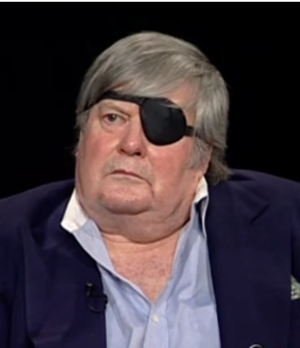Warren Hinckle
(journalist) | |
|---|---|
 | |
| Born | Warren James Hinckle III October 12, 1938 San Francisco, California |
| Died | August 25, 2016 (Age 77) San Francisco, California |
Cause of death | pneumonia |
| Alma mater | University of San Francisco |
| Children | 3 |
As editor of Ramparts, revealed all-embracing CIA financing and control of the international operations of all important American professional and cultural organisations. | |
Warren James Hinckle III was an American political journalist based in San Francisco.[1] Hinckle is remembered for his tenure as editor of Ramparts magazine, turning a sleepy publication aimed at a liberal Roman Catholic audience into a major galvanizing force of American radicalism during the Vietnam War era. It was also highly critical of the Warren Commission and revealed a major scoop, the massive CIA funding of NGOs like the National Student Association.
Biography
As a student at the University of San Francisco, Warren Hinckle wrote for the student newspaper, the San Francisco Foghorn. After college, he worked for the San Francisco Chronicle.
From 1964 to 1969, he was executive editor of Ramparts, a widely circulated muckraking political magazine of the Catholic left, heavily involved in the antiwar New Left politics of the period. Under his leadership, the magazine won the prestigious George Polk Award for Magazine Reporting in 1966. Hinckle wrote the cover story, "The Social History of the Hippies," for the March 1967 issue. Contributing editor Ralph J. Gleason resigned in protest and turned his attention to a new magazine, Rolling Stone, which he co-founded with former Ramparts staffer Jann Wenner.
In January 1967 Hinckle, met a man by the name of Michael Wood at the Algonquin Hotel in New York City. Wood told Hinckle that the National Student Association (NSA) was receiving funding from the CIA. At first Hinkle thought he was being set-up. However, after further research, Hinckle was convinced that the CIA had infiltrated the Non-Communist Left:
“While the ADA-types and the Arthur Schlesinger model liberal kewpie dolls battled fascism by protecting their right flank with domestic Red-baiting and Cold War one-upmanship, the Ivy League delinquents who fled to the CIA – liberal lawyers, businessmen, academics, games-playing craftsmen – hatched a master plan of Germanic ambition that entailed nothing less than clandestine political control of the international operations of all important American professional and cultural organisations: journalists, educators, jurists, businessmen, et al. The standing CIA subsidy to the National Student Association was but one slice of a very complex pie.”
Warren Hinckle (1967) [2]
At the end of 1966 Desmond FitzGerald head of the CIA's Directorate for Plans, took charge of Operation Mockingbird. FitzGerald ordered Edgar Applewhite to organize a campaign against the magazine. Applewhite later told Evan Thomas for his book, The Very Best Men: "I had all sorts of dirty tricks to hurt their circulation and financing. The people running Ramparts were vulnerable to blackmail. We had awful things in mind, some of which we carried off."
For its exposé of the CIA, Ramparts received the George Polk Memorial Award for Excellence in Journalism and was praised for its "explosive revival of the great muckraking tradition."
In 1967, Hinckle was among more than 500 writers and editors who signed the "Writers and Editors War Tax Protest" pledge, vowing to refuse to pay the 10% Vietnam War Tax surcharge proposed by president Johnson.[3]
After leaving Ramparts in 1969, Hinckle co-founded and edited the magazine Scanlan's Monthly with New York journalist Sidney Zion. There he matched illustrator Ralph Steadman with Hunter S. Thompson to produce "The Kentucky Derby Is Decadent and Depraved" (1970), the first work of Gonzo journalism.
After Scanlan's folded in 1971, Hinckle was involved with a number of publications, including editing Francis Ford Coppola's ambitious City magazine, which ceased publication in 1976. In 1991 he revived The Argonaut, and was its editor and publisher and also of its online version, Argonaut360.
Hinckle wrote or co-wrote over a dozen books, including a 1974 autobiography, If You Have a Lemon, Make Lemonade.
After working for both major San Francisco dailies, the Chronicle and The San Francisco Examiner, Hinckle went to work as a columnist for the San Francisco Independent, founded in 1987. Hinckle used his post at the Independent to advocate for his personal political beliefs. During his time at the Independent Hinckle also wrote campaign literature for various politicians.[4]
Hinckle wore a black patch to cover an eye that was lost in his youth due to an archery accident. (The San Francisco Chronicle said it was an auto accident). He was the father of the journalist Pia Hinckle. He died of pneumonia on August 25, 2016 at the age of 77 at a hospital in San Francisco.[5][6]
References
- ↑ https://books.google.com/books?id=P3pQAQAAIAAJ
- ↑ https://spartacus-educational.com/JFKhinckle.htm
- ↑ "Writers and Editors War Tax Protest" January 30, 1968, New York Post
- ↑ http://www.sfgate.com/bayarea/matier-ross/article/Print-and-politics-mix-it-up-with-dollop-of-3314496.php
- ↑ http://napavalleyregister.com/news/state/muckraking-sf-journalist-warren-hinckle-dies-at/article_4910e7e4-5ab8-5507-8ba1-294ed233a7b0.htm
- ↑ http://www.latimes.com/local/lanow/la-me-ln-hinckle-obit-20160824-snap-story.html